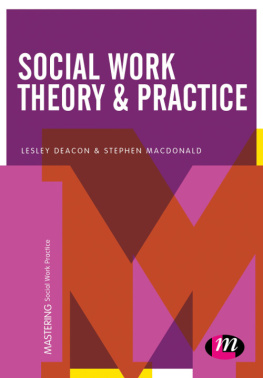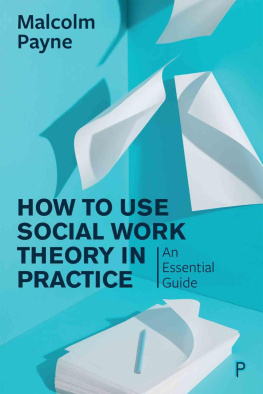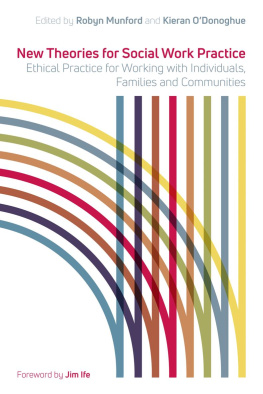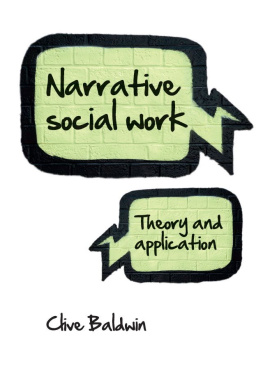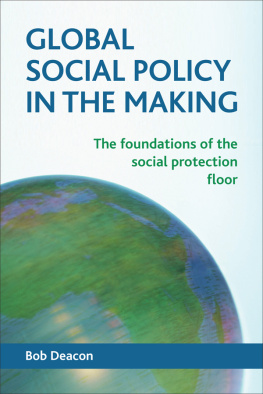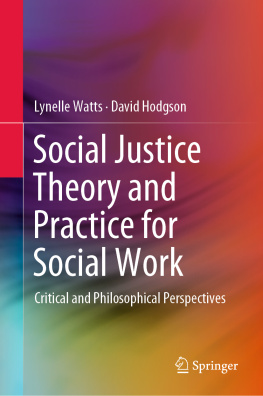SAGE was founded in 1965 by Sara Miller McCune to support the dissemination of usable knowledge by publishing innovative and high-quality research and teaching content. Today, we publish over 900 journals, including those of more than 400 learned societies, more than 800 new books per year, and a growing range of library products including archives, data, case studies, reports, and video. SAGE remains majority-owned by our founder, and after Saras lifetime will become owned by a charitable trust that secures our continued independence.
Los Angeles | London | New Delhi | Singapore | Washington DC | Melbourne

Lesley Deacon and Stephen J Macdonald 2017
First edition published in 2017 by Learning Matters Ltd, an imprint of SAGE
Apart from any fair dealing for the purpose of research or private study, or criticism or review, as permitted under the Copyright, Designs and Patents Act, 1988, this publication may be reproduced, stored or transmitted in any form, or by any means, only with the prior permission in writing of the publishers, or in the case of reprographic reproduction, in accordance with the terms of licences issued by the Copyright Licensing Agency. Enquiries concerning reproduction outside those terms should be sent to the publishers.
Library of Congress Control Number: 2016954952
British Library Cataloguing in Publication Data
A catalogue record for this book is available from the British Library
ISBN 978-1-4739-5869-2
ISBN 978-1-4739-5870-8 (pbk)
Learning Matters
An imprint of SAGE Publications Ltd
1 Olivers Yard
55 City Road
London EC1Y 1SP
SAGE Publications Inc.
2455 Teller Road
Thousand Oaks, California 91320
SAGE Publications India Pvt Ltd
B 1/I 1 Mohan Cooperative Industrial Area
Mathura Road
New Delhi 110 044
SAGE Publications Asia-Pacific Pte Ltd
3 Church Street
#10-04 Samsung Hub
Singapore 049483
Editor: Kate Wharton
Development editor: Lauren Simpson
Production controller: Chris Marke
Project management: Deer Park Productions
Marketing manager: Camille Richmond
Cover design: Wendy Scott
Typeset by: C&M Digitals (P) Ltd, Chennai, India
Printed in the UK
At SAGE we take sustainability seriously. Most of our products are printed in the UK using FSC papers and boards. When we print overseas we ensure sustainable papers are used as measured by the PREPS grading system. We undertake an annual audit to monitor our sustainability.
Acknowledgements
Lesley Deacon would like to thank the following people at the University of Sunderland: Stephen J Maconald, her research mentor, for working with her on this project; all the authors who contributed to this book; and Jane Tunmore, her line manager, for supporting her. At SAGE, she is grateful to Kate Wharton for being so supportive of the proposal; and all the staff for their excellent work on the book. Finally, she would particularly like to Matt and Jake Deacon for their huge encouragement, support and unofficial work on this book! She would like to dedicate this book to David Staward.
Stephen J Macdonald would like to dedicate this book to Jude, Jamie and Claire Macdonald.
About the authors
Dr Lesley Deacon is a Senior Lecturer in Applied Social Studies and Social Work, and Faculty Disability Tutor at the University of Sunderland (which she joined in 2011). Prior to this she was a practising social worker within safeguarding children with a particular interest in parents with learning disabilities. She teaches theory, research and practice across the BA and MA Social Work programmes and the BSc Health and Social Care. She is also programme leader for the Foundation Degree in Health and Social Care. Her research is primarily focused on how generic health and social care services respond to people who have more specialised needs. In her current research she is co-researcher with Dr Stephen J Macdonald researching the relationship between dyslexia, homelessness and substance use; as well as missed opportunities for intervention. The final part of the research will focus on health and social care practitioners in order to understand how they respond to adult service users who may have particular needs in relation to their dyslexia.
Dr Stephen J Macdonald is a Reader in Social Science. He joined the University of Sunderland in 2005 and is now the strand leader for the Centre for Applied Social Sciences. He teaches undergraduates and postgraduates in sociology, criminology, education, social work and social care. Stephen has published broadly in the areas of dyslexia and social exclusion, including issues concerning diagnosis, educational disengagement, digital inclusion, crime, victimisation and homelessness. His work is underpinned by the social model of disability. Stephen is also the associate editor for Insights on Learning Disabilities (ILD), an international journal. He is also a Fellow of the Higher Education Academy. In his present research, he is investigating the relationship between dyslexia and homelessness and disability and hate crime.
Professor Catherine Donovan is a Professor in Social Relations and Head of the Centre for Applied Social Sciences at the University of Sunderland. She is part of the Sociology programme team, teaching the sociology of family, gender and sexuality as well as the sociology of health and gendered violence. Catherine has spent nearly 30 years researching the intimate and family lives of lesbians, gay and, more recently, bisexual and trans-people. Her recent co-authored book, Domestic Violence and Sexuality: Whats love got to do with it? reports on the first study comparing love and violence in heterosexual and same sex relationships with a focus on how love is implicated in violent and abusive relationships. Catherine led the Coral Project, an ESRC collaborative project focusing for the first time on the abusive behaviours of LGBT people in their intimate relationships. She is also involved with a collaborative project on hate incidents; a survey of victimisation and perpetration in student populations; and is developing a Bystander Intervention Programme. Catherine is also working in collaboration with colleagues at Huddersfield, Sheffield Hallam and an independent research organisation to develop projects on child sexual exploitation and sex and relationship education for young LGB and/or T people.
Introduction
Lesley Deacon
The intention of this book is to introduce students and social work practitioners to key theories in understanding individuals experiences and behaviour in the course of social work practice today. The theories covered are not meant to be an exhaustive list but to give a flavour of some of the key areas of theory that students and practitioners alike need to consider in order to understand service users and carers that they encounter in practice. sets out the theoretical paradigm applied to this book, which is also applied to the way in which social work theory is taught at the University of Sunderland, where all the authors and contributors teach and research.
It is important to note that the way in which this book is written is to try and explain the theories in clear language in order to remove some of the barriers students and social work practitioners feel exist between them, their practice and their understanding of theory. Certain theoretical terminology is necessary but where this is used explanations are given. The intention of this is to equip the reader with the knowledge and understanding of theory in order for them to research further.




